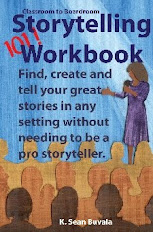Yikes. A "master storyteller" does not want an audience "drunk on emotion."
Over at the "Fast Company" website (major business magazine), there's a poetic but off-base article about business storytelling: "Why Storytelling is the Ultimate Weapon." Take a read of the article if you'd like. Here's my reaction. I posted it on the FC website but the formatting went wonky. Here is a clearer picture, adapted from my comments I posted on the FC site:
To put my response in context: I’ve been thinking about this article from the perspective of a storytelling professional. That’s biz coaching, story performance and authoring books for some 26 years. I’ve been working with online discussions of storytelling since before Google even existed.
It's a good article on the science of storytelling overall. After that, I am not sure what to think. I don't know what this article adds to the "business storytelling" discussion specifically, except more theory. And, as I experience it, there is more than enough business storytelling theory floating around. Let’s be much more practical and put out some serious how-to versus more emotional-focused poetry.
If I am reading this correctly, the article is filed under this site's category of "Industry POV." I don't see an exclusive business POV here. Substitute "education,” “health care” or “babysitting" whenever the word "business" is mentioned and the article still works. Maybe use the words "teachers,” “doctors” or “low-paid teenagers" for the word "professionals," too. This could easily have been about “storytelling in education” in the NEA magazine instead of business in the Fast Company magazine. Maybe it was just poor placement by Fast Company that leaves me so underwhelmed.
I do struggle with the author's well-intentioned closing. Discounting the use of logic/facts in trade for (insert soft music here) narrative really damages the truth of what story can do. The purpose of story (real-life, world tale or fairy tale) is to carry logic and reason, not to replace it. I mentioned this earlier in a response to another poster: my goal as a storyteller (in any situation) is rarely just an emotional response. Oh, sure, I can achieve that when it’s desired. However, what I want is to go beyond the emotional with a longer-lasting (but slower in forming) lesson, meaning or message. Emotional response is more a feature of good theater or acting techniques. However, storytelling is not acting, including when used in business settings.
This takes me back to: "master storyteller" does not want an audience "drunk on emotion." I actually think this is rather comical.
Insisting (as I think I see in the article) that we *must* begin with "once upon a time" for every audience all the time discounts the very nature and work of a storyteller in the boardroom or on stage. As a storyteller, my experience teaches me to know both when to lead with a story and when not to. Being mindful of story placement is a real skill.
******
The is the official blog for K. Sean Buvala, storyteller and storytelling coach.
Subscribe to:
Post Comments (Atom)






No comments:
Post a Comment